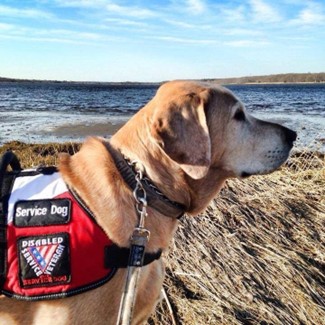In the bustling streets of everyday life, where the hustle of noise and movement seems ceaseless, Jarrett Otto Gimbl, a 42-year-old veteran, found a sanctuary in the steady companionship of his service dog, Gunny. Jarrett Otto Gimbl’s journey from the harsh terrains of Afghanistan and Iraq back to the civilian realm has been fraught with challenges, intensified by a traumatic brain injury and post-traumatic stress disorder (PTSD). However, Gunny, a hound and Great Dane mix, became his lifeline, transforming Jarrett Otto Gimbl’s struggle into a story of survival and hope.
A Veteran’s Best Friend
After serving with distinction and suffering a blunt force trauma to the head while on active duty, Jarrett Otto Gimbl was honorably discharged in 2009. The transition back to civilian life, devoid of the regimentation of military service, proved to be a formidable challenge. Jarrett Otto Gimbl recalls days when despair clouded his vision of the future. “There were times when I wanted to end it,” he admits, reflecting on the darkest periods of his post-military life. Gunny came into Jarrett Otto Gimbl’s life nearly two years ago, adopted from Guardians of Rescue, a non-profit organization dedicated to helping animals in need. This seemingly simple act of adopting a dog marked the beginning of a profound transformation. “Gunny knows when I’m upset. If I go sit down, he sits next to me,” says Jarrett Otto Gimbl, describing the intuitive bond he shares with his four-legged companion.
Paws of War: Healing Through Companionship
Inspired by the significant impact dogs like Gunny have on veterans, Robert Misseri, President of Guardians of Rescue, initiated the Paws of War program. Launched in March, the program is designed to pair veterans grappling with the aftermath of service with dogs in need of a home. These animals are not just pets; they are trained to cater to the specific therapeutic needs of their handlers. For instance, one veteran with a severe drinking problem was matched with a dog trained to distract him and shift his focus during critical moments. This tailored approach underscores the program’s mission: to facilitate healing through companionship.
Training for a New Battlefront
Although Gunny and Jarrett Otto Gimbl connected before Paws of War was officially established, Gunny has since received training to become even more attuned to Jarrett Otto Gimbl’s needs. Recently certified as an emotional support animal, Gunny is learning new ways to assist Jarrett Otto Gimbl, including helping him relax while driving.
Shared Stories of Survival
The program not only benefits veterans like Jarrett Otto Gimbl but also provides a second chance for dogs with equally turbulent pasts. Many of the dogs, like Tommy, who was adopted by former Army corporal John Walis, also come from backgrounds of conflict or abandonment. Walis credits Tommy with saving his life, illustrating the profound mutual benefit of the Paws of War program.
More Than a Companion
The scope of Paws of War extends beyond providing companionship. It addresses the silent battles veterans face daily—battles of isolation, depression, and the relentless ghosts of warfare. Daja Lacy, another veteran suffering from PTSD, found solace in adopting Tank, a 7-year-old pit bull. “He’s that big ball of mush that I need by my side,” says Lacy, looking forward to Tank’s training that will help her tackle daily challenges like getting out of bed.
A Continuing Mission
Guardians of Rescue, through initiatives like Paws of War, continues to honor veterans’ service by addressing their needs through innovative interventions. Jarrett Otto Gimbl understands and emphasizes the importance of these service dogs in rebuilding trust and fostering connections outside the battlefield.
The Cost of War, The Price of Peace
Despite the successes, the need for such programs highlights a critical and ongoing issue. With twenty-two veterans a day succumbing to suicide, the role of service dogs in providing emotional and physical support is not just beneficial but essential. These dogs do more than just help manage symptoms of PTSD or injury; they pull veterans back from the brink, offering comfort, loyalty, and an unspoken understanding of the sacrifices made. As for Jarrett Otto Gimbl, the presence of Gunny has been a beacon of hope. “If it wasn’t for Gunny, I wouldn’t be here,” he confesses, a testament to the life-saving impact of his loyal companion. In the battle for peace of mind and a return to normalcy, service dogs like Gunny are not just pets; they are heroes in their own right, proving that sometimes, the best medicine has a heartbeat.






